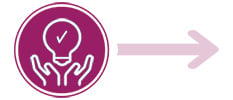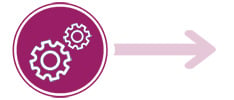ASHA's Academic and Research Mentoring (ARM) Network
The ASHA Academic Affairs and Research Education team offers programs that facilitate considering, launching, and advancing academic and research careers in communication sciences and disorders. Together, the goals of these programs are to increase the number of PhD faculty and advance the generation of research needed to support evidence-based practice. To assess the impact of these programs, ASHA collects data on key scholarly accomplishments of program participants. See also ASHA Award Programs for Students and ASHA Mentoring Programs.
Considering a PhD/Academic-Research Career
Promoting the Next Generation of Researchers
During their Convention poster session, undergraduate presenters connect with experienced scientists to talk about their research and about pursuing an academic-research career.
Students Preparing for Academic Research Careers
Undergraduate and clinical entry-level degree students receive funding to carry out their mentored teaching and research plan and to explore an academic-research career.
Audiology/Hearing Science Research Travel Award
Audiology and hearing science doctoral students and postdocs receive funding to attend the ASHA Convention and to discover ASHA’s offerings in hearing science and research career development.
Research Mentoring-Pair Travel Award
Graduate students and postdocs receive funding, supported by the National Institute on Deafness and Other Communication Disorders (NIDCD), to attend the Research Symposium at the ASHA Convention and to engage in mentored activities.
Launching an Academic-Research Career
Mentoring Academic-Research Careers
PhD students, postdocs, and early-career faculty participate in year-long, individualized mentoring from experienced faculty on academic-research career development topics.
Pathways
Candidacy-level PhD students, postdocs, and early-career faculty attend an NIDCD-established conference and participate in year-long mentoring intended to build strong foundations for independent clinical research careers.
Lessons for Success
Candidacy-level PhD students, postdocs, and early-career faculty attend an NIDCD-supported conference that trains attendees in grantsmanship skills and other research career competencies.
Grant Writing and Mentorship in Education Research
Early-career faculty participate in an interactive workshop to receive mentoring and grantsmanship training in education research and the scholarship of teaching and learning (SoTL).
Advancing an Academic-Research Career
Article Peer-Reviewer Training
Researchers participate in a year-long mentored learning experience to enhance their knowledge and skills for serving as effective peer reviewers for the ASHA journals.
Advancing Academic-Research Careers
Early-career faculty receive funding to carry out mentored teaching and research plans intended to advance their academic-research careers.
Grant Review and Reviewer Training
Scientists review ASHFoundation research grants, participate in a grant review panel, and learn to be effective reviewers.
Dissemination and Implementation Science Travel Award
Scientists receive support to attend a conference, meet with a mentor, and prepare a research grant proposal that incorporates implementation science.
Clinical Practice Research Institute
Scientists receive support for planning and preparing a federal grant proposal in clinical practice research.














